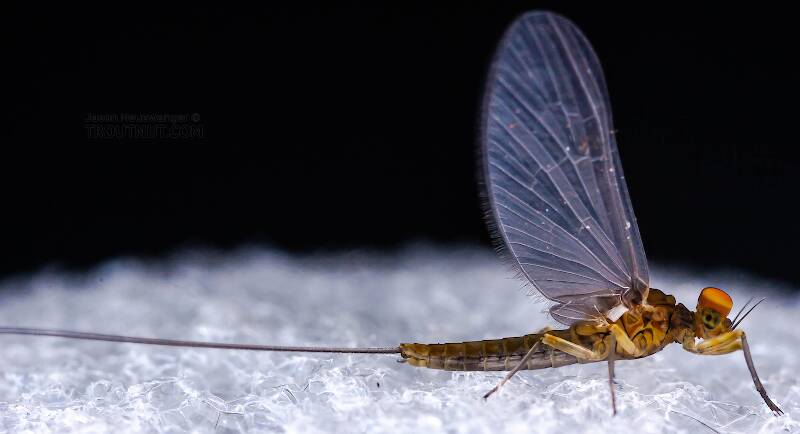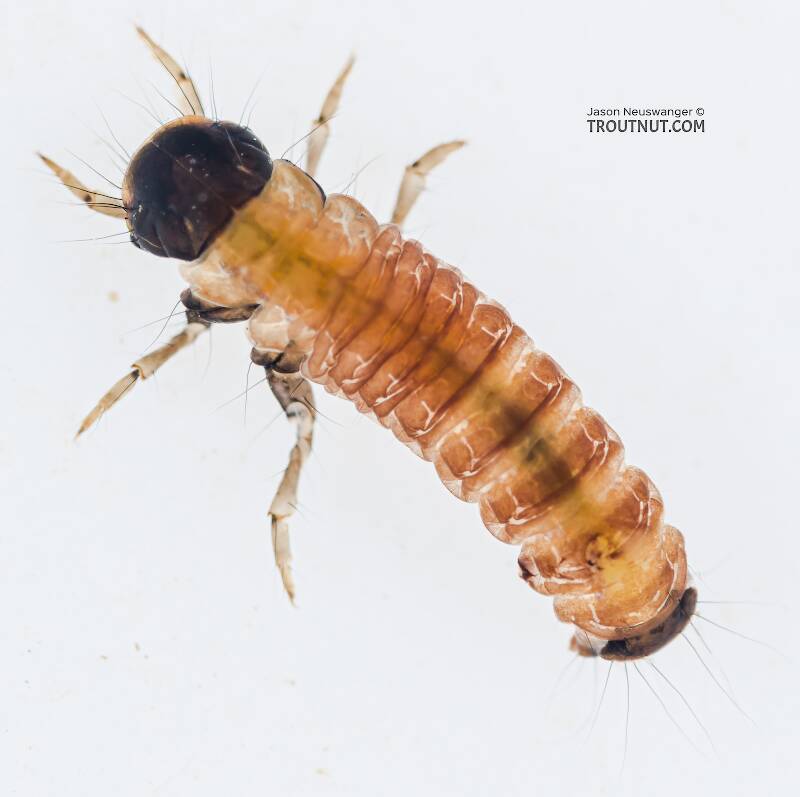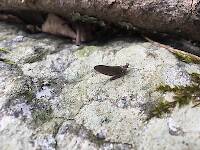
Blue-winged Olives
Baetis
Tiny Baetis mayflies are perhaps the most commonly encountered and imitated by anglers on all American trout streams due to their great abundance, widespread distribution, and trout-friendly emergence habits.
Featured on the forum

I caught this tiny larva without a case, but it seems to key pretty clearly to to Glossosomatidae. From there, the lack of sclerites on the mesonotum points to either Glossosoma or Anagapetus. Although it's difficult to see in a 2D image from the microscope, it's pretty clear in the live 3D view that the pronotum is only excised about 1/3 of its length to accommodate the forecoxa, not 2/3, which points to Glossosoma at Couplet 5 of the Key to Genera of Glossosomatidae Larvae.

Troutnut is a project started in 2003 by salmonid ecologist Jason "Troutnut" Neuswanger to help anglers and
fly tyers unabashedly embrace the entomological side of the sport. Learn more about Troutnut or
support the project for an enhanced experience here.
IEatimago on Oct 27, 2007October 27th, 2007, 8:33 am EDT
i tend to organize my boxes by season and i like to have a box for caddis, one for mayfly and terestrials,and a night box, i have a few nymphs in a box but i am a lousy nymph fishermen unless is after dark for some reason so it doesnt get ot much, some time i play silly games with myself where i will only bring 3 types of flies and try my best to anticipate whats going to happen on stream some times its great some times im pissed,
but its fun, and when you fish everyday some times its fun to break up the routine a bit.
yesturday i only brought bwo's in 18 and #20 and #19 elk hair and had a great time.
i dont see the point of bringing lots of boxes with lots of flys when you know that its not the right time of the season or the weather is to cold or to hot for certain bugs to pop off,
but this could be my inexperience talking.
but its fun, and when you fish everyday some times its fun to break up the routine a bit.
yesturday i only brought bwo's in 18 and #20 and #19 elk hair and had a great time.
i dont see the point of bringing lots of boxes with lots of flys when you know that its not the right time of the season or the weather is to cold or to hot for certain bugs to pop off,
but this could be my inexperience talking.
GONZO on Oct 28, 2007October 28th, 2007, 7:08 am EDT
If you look, I think you'll find a version of this discussion on every fly-fishing website, with many of the same opinions being expressed, ad infinitum. What's more, versions of this debate were raging long before any of us were born. More than simplicity vs. complexity, or imitation vs. presentation, or a few flies vs. many, I think it is the tendency to assume that there is some universally right or wrong approach that leads to confusion, especially for newcomers looking for help. And rather than the debate providing clarity or answers, it often contributes to the notion that fly fishing is baffling and incomprehensible.
Try this: Consider that our opinions and approaches are shaped not only by personal preferences (the approaches we enjoy), but also by the waters we fish and the ways we find success in those waters. From this perspective, it's usually possible to make sense of all the various approaches and to apply those lessons to other similar waters.
For example, an angler who fishes mostly small, relatively impoverished (fertility/food) streams for wild trout, soon discovers that fly choice and imitation are minor or insignificant considerations, and that approach and presentation are everything. If that angler can present a fly to the fish without scaring the bejesus out of them, he (or she) stands a good chance of success. (This is providing that the angler also has the sense not to constantly hammer the same locations with the same flies day after day. Even these hungry and eager fish can learn to shy away from flies under constant pressure. I've seen that happen time and again when "secret" little waters were suddenly exposed to increased pressure through publicity.)
Along the same lines, an angler who fishes mostly for stocked fish in a put-and-take situation can catch fish with most any fly and can even succeed without much skill from an approach and presentation standpoint. That is, until later in the season, when the few surviving fish finally start to wise up a bit.
In contrast, an angler whose home waters are larger or richer, and have abundant or diverse hatches that capture the fish's attention on a regular basis learns that there is some point to trying to imitate or suggest those hatches on at least some basic level. Of course, there are some anglers who can find success even on these waters by ignoring the hatches and either fishing at other times or by locating fish that are not so preoccupied by the abundance of a particular food. Unless these same waters are also subject to lots of fly-fishing pressure, even the "hatch-matcher" only rarely has the need to go beyond basic or classic suggestions of those hatches.
At the far end of this spectrum is the angler who fishes rich waters containing fussy trout that are subjected to almost constant pressure from highly skilled fly fishers. That angler often finds a need for continuous experimentation and adjustment in order to have regular success. Sometimes this takes the form of an extreme focus on imitation or presentation, or both. At other times, anglers can find at least temporary success by ignoring all the "rules" about both aspects in an effort to find flies or methods of presentation that the fish have not yet learned to resist.
Of course, there are many possibilities presented by any given stream or situation, and on a given day, any one (or none) of these approaches might yield success. But, through the course of the season, it is usually the character of the water and the way it shapes the lives of the fish and their reactions that determines the overall approach.
I'd encourage every fly fisher to read the beginning three pages of the chapter "The Dry Fly, Upstream and Down" in A.J. McClane's classic book, The Practical Fly Fisherman. In it, he describes the very different approaches of three very successful fly fishers. He says: Take the time to consider what McClane says in those pages with an open mind, and you can't help but realize that each of these fly fishers had become so skilled at his personal approach that he could catch fish just about anywhere. And that may be the ultimate answer to reconciling all of the different opinions and approaches. As William Blake famously said, "If a fool would persist in his folly, he would become wise."
Best,
Gonzo
Try this: Consider that our opinions and approaches are shaped not only by personal preferences (the approaches we enjoy), but also by the waters we fish and the ways we find success in those waters. From this perspective, it's usually possible to make sense of all the various approaches and to apply those lessons to other similar waters.
For example, an angler who fishes mostly small, relatively impoverished (fertility/food) streams for wild trout, soon discovers that fly choice and imitation are minor or insignificant considerations, and that approach and presentation are everything. If that angler can present a fly to the fish without scaring the bejesus out of them, he (or she) stands a good chance of success. (This is providing that the angler also has the sense not to constantly hammer the same locations with the same flies day after day. Even these hungry and eager fish can learn to shy away from flies under constant pressure. I've seen that happen time and again when "secret" little waters were suddenly exposed to increased pressure through publicity.)
Along the same lines, an angler who fishes mostly for stocked fish in a put-and-take situation can catch fish with most any fly and can even succeed without much skill from an approach and presentation standpoint. That is, until later in the season, when the few surviving fish finally start to wise up a bit.
In contrast, an angler whose home waters are larger or richer, and have abundant or diverse hatches that capture the fish's attention on a regular basis learns that there is some point to trying to imitate or suggest those hatches on at least some basic level. Of course, there are some anglers who can find success even on these waters by ignoring the hatches and either fishing at other times or by locating fish that are not so preoccupied by the abundance of a particular food. Unless these same waters are also subject to lots of fly-fishing pressure, even the "hatch-matcher" only rarely has the need to go beyond basic or classic suggestions of those hatches.
At the far end of this spectrum is the angler who fishes rich waters containing fussy trout that are subjected to almost constant pressure from highly skilled fly fishers. That angler often finds a need for continuous experimentation and adjustment in order to have regular success. Sometimes this takes the form of an extreme focus on imitation or presentation, or both. At other times, anglers can find at least temporary success by ignoring all the "rules" about both aspects in an effort to find flies or methods of presentation that the fish have not yet learned to resist.
Of course, there are many possibilities presented by any given stream or situation, and on a given day, any one (or none) of these approaches might yield success. But, through the course of the season, it is usually the character of the water and the way it shapes the lives of the fish and their reactions that determines the overall approach.
I'd encourage every fly fisher to read the beginning three pages of the chapter "The Dry Fly, Upstream and Down" in A.J. McClane's classic book, The Practical Fly Fisherman. In it, he describes the very different approaches of three very successful fly fishers. He says:
The schools of thought that fall between the extremes of these three men are infinite, and taken at their face value it would seem that somebody has to be wrong. If you stop to analyze each, however, without getting involved in what the trout sees or thinks, vagrant facts begin to make sense.
Best,
Gonzo
SpringCreek on Oct 29, 2007October 29th, 2007, 2:24 am EDT
Nicely put Gonzo. There is a lot to consider in those few sentences.
I appreciate your point of trout seeing a particular fly often enough to no longer select it as a food item. I can't bring myself to see this as cognitive, nor did you suggest such, so I'm wondering what exactly it is behind a fishes refusal. Must "educated" fish have some amount of reasonning ability?
They obviously recognize threats from above that cast a shadow on the water ala great blue heron.
I don't intend to hijack this thread but I'm wondering what some of you think. I have read studies suggesting that fish can be trained to repeatedly strike a particular target in order to recieve a reward. (food)
So, my question becomes, just what level of intelligence do fish posess?
I appreciate your point of trout seeing a particular fly often enough to no longer select it as a food item. I can't bring myself to see this as cognitive, nor did you suggest such, so I'm wondering what exactly it is behind a fishes refusal. Must "educated" fish have some amount of reasonning ability?
They obviously recognize threats from above that cast a shadow on the water ala great blue heron.
I don't intend to hijack this thread but I'm wondering what some of you think. I have read studies suggesting that fish can be trained to repeatedly strike a particular target in order to recieve a reward. (food)
So, my question becomes, just what level of intelligence do fish posess?
Softhackle on Oct 29, 2007October 29th, 2007, 3:44 am EDT
I don't mind you posting any question in this thread. It's a good question. I believe that trout:
Are predatory in nature.
Are basic creatures that survive using tropisms and their senses which they are born with.
Can be conditioned to give a particular response.
As such, there usually is some action that the trout react to. With regard to feeding, I think that trout will react to threats from above and do so. I also think that because of there predatory nature they are very opportunistic. In other words, they will definitely take advantage of feeding if the food source looks and behaves like the food they are accustomed to seeing. They are especially good at taking advantage of the situation if the food source is abundant, is easily obtained, and does not require more energy to get than its value nutritionally.
My belief is that we give a lot more credit to the trout-"brain-wise"- than they deserve. Many will argue this fact, but trout are creatures of evolution and they are pretty adapted to the life they lead. Can they become more cautious over time. Yes, I think so, but this is because they may have been caught before. If they're caught "enough times", the conditioned response may be altered. Also trout that "see" a lot of fishermen, are more likely to be cautious. Remember, caution, does not necessarily mean you are intelligent. A negative stimulant may condition a creature into a specific behavior. Many creatures are born with a natural instinct to flee from danger. This is not learned thing-it's instinct to help the creature survive.
Mark
Are predatory in nature.
Are basic creatures that survive using tropisms and their senses which they are born with.
Can be conditioned to give a particular response.
As such, there usually is some action that the trout react to. With regard to feeding, I think that trout will react to threats from above and do so. I also think that because of there predatory nature they are very opportunistic. In other words, they will definitely take advantage of feeding if the food source looks and behaves like the food they are accustomed to seeing. They are especially good at taking advantage of the situation if the food source is abundant, is easily obtained, and does not require more energy to get than its value nutritionally.
My belief is that we give a lot more credit to the trout-"brain-wise"- than they deserve. Many will argue this fact, but trout are creatures of evolution and they are pretty adapted to the life they lead. Can they become more cautious over time. Yes, I think so, but this is because they may have been caught before. If they're caught "enough times", the conditioned response may be altered. Also trout that "see" a lot of fishermen, are more likely to be cautious. Remember, caution, does not necessarily mean you are intelligent. A negative stimulant may condition a creature into a specific behavior. Many creatures are born with a natural instinct to flee from danger. This is not learned thing-it's instinct to help the creature survive.
Mark
"I have the highest respect for the skilled wet-fly fisherman, as he has mastered an art of very great difficulty." Edward R. Hewitt
Flymphs, Soft-hackles and Spiders: http://www.troutnut.com/libstudio/FS&S/index.html
Flymphs, Soft-hackles and Spiders: http://www.troutnut.com/libstudio/FS&S/index.html
Shawnny3 on Oct 29, 2007October 29th, 2007, 9:56 am EDT
I don't know if you've seen it, SpringCreek, but there was a quite recent thread called "educated fish" on this very topic.
-Shawn
-Shawn
Jewelry-Quality Artistic Salmon Flies, by Shawn Davis
www.davisflydesigns.com
www.davisflydesigns.com
SpringCreek on Oct 29, 2007October 29th, 2007, 10:29 am EDT
I did in fact see it,... About three minutes after I posted this question in this thread, sorry. I need to spend some serious time reading some of the other posts.
Softhackle on Oct 29, 2007October 29th, 2007, 12:26 pm EDT
Guess I sorta missed it, so I'll go read it, now.
Mark
Mark
"I have the highest respect for the skilled wet-fly fisherman, as he has mastered an art of very great difficulty." Edward R. Hewitt
Flymphs, Soft-hackles and Spiders: http://www.troutnut.com/libstudio/FS&S/index.html
Flymphs, Soft-hackles and Spiders: http://www.troutnut.com/libstudio/FS&S/index.html
Quick Reply
Related Discussions
Topic
Replies
Last Reply
9
May 15, 2016
by Adam412
by Adam412
5
Jun 14, 2008
by Wiflyfisher
by Wiflyfisher



